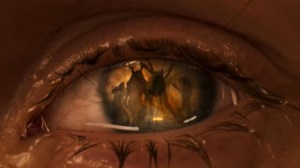Throughout his career, screenwriter David Koepp has given audiences a number of thrilling narratives, from Jurassic Park to Stir of Echoes to Panic Room, the most recent of which was this year’s You Should Have Left from Bllumhouse Productions. The filmmaker is offering audiences an all-new project with the new Audible original Yard Work, which sees another reunion with Bacon, who narrates the thrilling story. Despite Yard Work offering horror fans a slightly different experience from Koepp’s previous endeavors, the narrative will surely unsettle audiences in all-new ways. Fans can check out Yard Work now, which is available exclusively through Audible.
Videos by ComicBook.com
Yard Work, Koepp’s first work of short fiction, follows an elderly judge, reeling from the death of his wife of 50-plus-years. Against his children’s wishes, the judge decides to live out the rest of his years at the lake house where he and his wife spent their happiest times. Shortly after arriving, the judge notices a vine aggressively growing on what was once the couple’s favorite tree. Quickly, it spreads into the house, onto his body, and eventually into his bloodstream. After taking several gruesome measures to fight off the vine, it becomes clear the vine has taken on a life of its own – and threatens to end his.
ComicBook.com recently caught up with Koepp to talk the new novella, the eerie nature of audio series, and how he reflects on past projects.

ComicBook.com: Since so many people know you for your work on films, when you started moving forward on Yard Work, had you always envisioned it as an audio project or did it start as something else and morph into this?
David Koepp: What’s great about it is, I would say, it was born knowing exactly what it wanted to be. I wrote a novel, my first book that came out last summer, called Cold Storage. And after almost 30 years of screenwriting, I really loved the freedom of writing prose, and that I can tell different kinds of stories about different characters, and get inside their heads a little more than you can with a movie script.
I’d had this idea for a story, because where I live, in Amagansett, New York, we’ve got this agricultural preserve, and there are these trees that are starting to be overgrown with these invasive vines that really did blow up after Hurricane Sandy seven or eight years ago. I started cleaning them out from the trees, because they were taking down trees and choking the life out of them. And I got kind of obsessed, the way my character does in the story, because once you start hauling them out of the trees, you see the trees, the branches reach up to the sky again, and it’s a great feeling. But the vines are so nasty and thorny and were tearing the sh-t out of my skin. And I just kept thinking, “One of these times I’m going to pull one of these down from the top of a tree and there’s going to be a mouth at the end of it.” And so, then a story was born.
Early in quarantine this year, I started writing it, and I knew I wanted the lead to be an 88-year-old guy. And it just immediately said it didn’t want to be a movie, in part because I didn’t want to hear a studio say, “Well, could he be a 48-year-old guy or 28? What if a young guy comes to the house?”
“What if it’s Zac Efron?”
Yeah, exactly. “Zac Efron’s newly married. She’s gorgeous, and they come to a house.” But I wanted an old man, because that’s what makes the challenge all the greater. I started writing it, and then the length that it came in at was too long for a short story, but far too short for a novel, but it didn’t really want to expand. That’s what it wanted to be.
I’m friends with David Blum, who’s the editor at audible. I just naturally started thinking of him for it. And what is fabulous about Audible originals is they’re allowed to be whatever they want to be. With a book, we have preset notions about how long that ought to be, typically 80,000 words-ish. Historical novel, maybe 110,000 words. As readers, we have a narrow range of what we think is a novel, but what’s beautiful about Audible originals is they’re meant to be different.
They’re meant to be listening experiences and they’re meant to be performed, sometimes by not just someone who’s reading the whole book from beginning to end. We have that in our case, but sometimes it can be a number of people reading it, performing it. Jesse Eisenberg had a great one come out a couple of weeks ago, called When You Finish Saving the World, and it’s terrific. But he’s got a bunch of actor friends and they put on a show, and I just loved that there was this fabulous, new-to-me outlet for ways to tell stories, particularly during the pandemic when nobody could leave the house.
Speaking personally, I really enjoy H.P Lovecraft’s audio dramas in a way that I don’t enjoy H.P Lovecraft movie adaptations. There’s something lost in translation when you’re hearing it versus seeing it.
He’s a tough adaptation, isn’t he? I haven’t watched Lovecraft Country yet, but it’s not truly him. He’s hard. There’s a reason I think that [At the] Mountains of Madness struggled for so long to get made, and still has struggles.
I would say, however, that Richard Stanley’s Color Out of Space is one of the best adaptations of Lovecraft’s work, I’m not sure if you’ve seen it.
Yeah, I did see it. It had one of those terribly weird Nic Cage lines, when the cops come over like half an hour in, because they say, “So tell us what happened.” And he says, “Well, my wife had a miscarriage, and we came to this house to work on our marriage.” Who says that? Why on earth would anyone say that? “No, no, sir, about the meteor.”
Whether with this project or audio dramas in general, what do you find so compelling about them that movies or TV shows can’t accomplish?
It goes back to radio, doesn’t it? I think that there’s something about letting your mind do a lot of the work and letting the listener’s mind do a lot of the work is just infinitely powerful. We always wax rhapsodic about filmmakers who are great at using suggestion in direction and keeping something off the screen. [Steven] Spielberg’s Jaws being probably the most famous example. But Stephen King talks about it in all horror, he’s like, “Keep the monster behind the door for as long as you possibly can, because eventually when you open the door, if there’s a 10-foot monster, the reader thinks, ‘Oh, thank God. I thought it was going to be a 100-foot monster.’”
So don’t open the door, just let the reader’s imagination continue to do its thing, because it’ll do its thing much better than you can. So you see the resurgence of storytelling in a spoken format since podcasts and such became part of our culture, but podcasts were nothing. They were just radio. That’s nothing new. And radio plays were intentionally powerful.
I remember as a kid, I heard reruns of CBS Radio Mystery Theater on Sunday nights on our local radio. This would have been in the early 1970s. So these were shows from the ’40s and ’50s, and it was incredibly powerful.
It’s funny that you casually mention people like Nicolas Cage or Steven Spielberg, who are both icons in Hollywood in their own respects, and these are both people who you’ve worked with on projects. Speaking to something like Jurassic Park, many people would consider it one of the best movies of all time, so whether it be that or Spider-Man, do you look back on those projects as a perfectionist and wish there were things you could have changed about them all these years later?
Well, you’d have to have something kind of wrong with you, to say, “Yeah, it’s beloved and it’s made all the money in the world. But boy, we really missed the boat on that.”
I feel like I have enough genuine failures that I could look back at and regret. I’m not going to try to make successes into failures. I was lucky to be part of that. I got to be one of a number of assistant storytellers who did some good work on a great piece of material. And so, it was lightning in a bottle. It was Michael Crichton’s genius idea and fabulous book, and Steven at the absolute peak of his creative powers and a bunch of terrific actors, Jeff Goldblum emerging as the strapping sex symbol that we all know him to be. There’s a certain amount of luck in anything coming together like that.
Whether it be Spielberg or Brian De Palma or Sam Raimi or David Fincher, is there a former collaborator that you’d drop everything to work with again?
Well I’ve worked with a number of them multiple times. I would, of course, love to work with Fincher again, because he’s one of the greatest, and we only did the one movie [Panic Room]. He’s so exacting and he’s so unwilling to be pushed around by a studio that it’s hard to imagine him doing a lot of features. I think that he found success and fulfillment in other areas. I hope he’ll do more. I can’t wait to see Mank. But I hope he makes more movies. I just know that he’s incredibly uncompromising, and he’s got a lot of rules by which he’ll play that the studios don’t want to accept.
Lastly, you previously wrote the script for Bride of Frankenstein when Bill Condon was attached to direct but that take on the concept didn’t move forward. Earlier this year, you mentioned you were working on a new draft of it for Universal, and while some fans were excited that the project was revived, others were disappointed that the only film focusing on a female Universal Monster was being written by a man and there were no female filmmakers even rumored to be involved. I was curious about what your message to fans with those frustrations might be or if there were talks of bringing in any female filmmakers as collaborators.
What I think that Universal is doing is they’re willing to make more than one movie on the subject. I think they have a couple different approaches to Invisible Man, and not just the one that they did. And Elizabeth Banks, I think, is working on one of them. They are willing to do … “Do you have a different idea for Dracula? Do you have a different idea for Bride of Frankenstein?”
They view these not as something that you get to do this once, and we can only do it every 38 years and that’s it. Anybody who wants to write a Bride of Frankenstein, go for it, go write a Bride of Frankenstein. If it’s good and it speaks to an audience, they’ll make it. So I don’t think there’s anything stopping anybody.
*****
Yard Work is available now exclusively through Audible.








